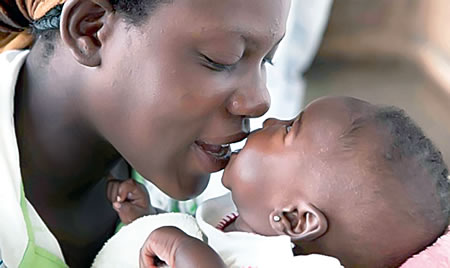In this article by Sade Oguntola, experts say that women should continue to monitor their blood pressure long after they’ve been delivered of their babies, especially if they had high blood pressure during pregnancy. The six weeks postnatal checkup is not enough.
Helen Nwankwo had a trouble-free pregnancy and a normal delivery with her second child, Charity, in October 2010, but five days after the birth, she developed strange symptoms that nearly took her life.
“I was nursing her all the time and waking up in the night to breastfeed but after a week, I started to have a heavy headache in the morning,” said Mrs Nwankwo, a teacher and a mother of two.
World Bank giving $4b grants to states ― NGF boss
The husband thought it was because she was tired from lack of sleep since the baby cries very often at night, wanting to take breastmilk. But at the nearby primary health care centre, she was told that her blood pressure was very high.
She was diagnosed with post-partum preeclampsia, a life-threatening rise in blood pressure that can cause seizures, stroke and even organ shutdown and death.
Pregnancy-induced hypertension, also called pre-eclampsia, is a pregnancy complication characterised by high blood pressure, swelling due to fluid retention and protein in the urine. Experts say the condition affects approximately one in 12 women.
Of those, only 5.7 per cent will develop post-partum pre-eclampsia, a rare form of the disease. About 76,000 women die of the condition each year worldwide.
But undetected high blood pressure is sometimes found in new mothers. A study in Hypertension, a journal of the American Heart Association, found that lingering hypertension is common among women who have severe pre-eclampsia during their pregnancies.
In fact, many women don’t know they have elevated blood pressure after they deliver.
The researchers warn that women with severe pre-eclampsia should have their blood pressure closely monitored for a year after giving birth because a high blood pressure can remain undetected.
According to them, that many women have normal blood pressure readings when in their doctor’s office doesn’t mean their levels do not spike elsewhere.
The researchers had studied 200 women for one year after their pregnancies, monitoring their blood pressure during the day and night as well as taking readings at doctors’ offices.
They found 17.5 per cent had masked hypertension. Their blood pressure was much higher when it was monitored at home. Also, if only the in-clinic readings were used, doctors would have missed 56 per cent of the women with high blood pressure.
The study also found that 46 per cent of the women had an insufficient decrease in blood pressure from daytime to nighttime, which is unhealthy.
Night-time hypertension, which increases the risk of heart disease, stroke and death, affected 42.5 per cent of women in the study.
The researchers stated: “Our findings suggest women who have high blood pressure during pregnancy should continue to monitor their blood pressure long after they had been delivered of their babies. It’s not only important to monitor blood pressure in the doctor’s office, but also at different times of the day and night, at home.
“We’ve shown here that high blood pressure comes in many forms after pregnancy. Women who know their numbers can take the proper steps to lower their blood pressure and avoid the health consequences of high blood pressure later in life.”
Sadly, pre-eclampsia is a leading cause of pregnancy-related deaths. A feasibility study on the disease in Ogun State, for instance, showed that the disease thrives more in rural areas where there are no medical facilities to look after pregnant women.
Dr Kayode Obembe, consultant Obstetrics and Gynaecologist, Christus Hospital, Ibadan, declared that pre-eclampsia affects women from all races, and about one out of every 10 pregnancies.
“Pre-eclampsia usually occurs after the fifth month of pregnancy until the end of pregnancy. It can also occur in labour or after delivery, till up to the sixth week after delivery,” he added.
Professor Sina Oladokun, a consultant obstetrician and gynaecologist, University of Ibadan, said this is why the emphasis is placed on postnatal care for women after giving birth.
“It is an opportunity for the caregiver to pick up those danger signs and then manage appropriately. That is why they are encouraged to go for postnatal care; it is preventive medicine,” he stated.
Given that women after giving birth can have elevated blood pressures, Professor Oladokun said they are also encouraged to keep monitoring their blood pressure at home or the nearest primary health care centre, especially those who have blood pressure issues during pregnancy.
He stated: “The way men develop high blood pressure; even so women that are not pregnant too can develop high blood pressure. An elevated blood pressure portends danger after childbirth; they stand a risk of developing complications associated with that.”
Unfortunately, Professor Oladokun stated, women run away from the postnatal care thinking that it is a waste of time because they believe that they are okay.
He said: “The essence of postnatal care is to assist women to regain their pre-pregnancy state. Some may not even have any medical problem. But when they come, the health worker will be able to allay their fears and help them cope with their challenges, especially the first-timers.
“In particular, for women that have issues with blood pressure or diabetes during pregnancy and deliveries, you will want to ensure that the blood pressure and sugar remain controlled. Without measurement, she cannot know if the blood pressure or sugar has come down.
“You know blood pressure does not have particular symptoms. It is there, it is silent yet the damage is going on in the body. So, it is only when she comes for postnatal checkup that they will say that this blood pressure is controlled or she still requires some medications.
“For such individual, it is a phase where it will now be able to control the medical challenges without having to think about the danger the treatment may pose to the baby in the womb.”
Oladokun declared that postnatal care also affords women opportunity of spacing their children as well as to better the health of their babies.
The expert explained that often, women have a background or an underlining medical problem that pregnancy triggers.
“Once the pregnancy is gone, they think that the danger is over, not knowing that it is still present. They have the risk factors for the disease and the pregnancy had just been its trigger. So, for those ones, they will continue with their medications until the next pregnancy,” he said.
Scientists already knew that women with pre-eclampsia were more likely to have high blood pressure after delivery compared to women who maintained normal blood pressure during their pregnancies.
Middle-aged women with previous severe pre-eclampsia have a three-fold increased risk of hypertension and up to a seven-fold increased risk of cardiovascular disease.
What is not known is that the percentage of women with hypertension is already this high one year after their pregnancies and that a large percentage of women have an insufficient fall in systolic blood pressure during nighttime. That is what actually increases their risk of developing a cardiovascular disease such as stroke.
WATCH TOP VIDEOS FROM NIGERIAN TRIBUNE TV
- Let’s Talk About SELF-AWARENESS
- Is Your Confidence Mistaken for Pride? Let’s talk about it
- Is Etiquette About Perfection…Or Just Not Being Rude?
- Top Psychologist Reveal 3 Signs You’re Struggling With Imposter Syndrome
- Do You Pick Up Work-Related Calls at Midnight or Never? Let’s Talk About Boundaries






